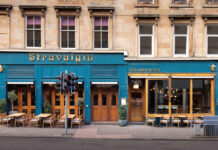Long-mooted tax is another example of political gouging

“Outrageous” – that was the Scottish Licensed Trade Association’s reaction when Scottish Labour recently vowed to impose a ‘social responsibility levy’ on the whole of the Scottish trade.
I simply can’t improve on that verdict. It’s a fundamentally-flawed plan that’s been kicked around for over 14 years – and it deserves to be buried once and for all.
Here’s the history. When the Licensing (Scotland) Bill was progressing through the parliament back in 2005 a new provision was inserted obliging operators to meet policing and other public service costs “directly attributable” to licensed premises.
Paul Martin MSP, the architect of the plan, drew a comparison with the contribution to policing costs made by football clubs.
But the amendment was ditched in the face of strenuous opposition displaying a really welcome degree of fairness and commonsense.
The costs with which the trade would be burdened couldn’t be calculated with any degree of accuracy; and, in any event, licensed businesses already paid taxes, could expect to benefit from local services and already contributed to costs through general taxation and non-domestic rates.
That, however, was not the end of the matter.
Addressing a licensing conference in Aviemore two years later, Kenny MacAskill, then justice secretary, called for a tax on late-opening venues. And when he was addressing a Holyrood committee on licensing fees he said, “[T]here is of course a broader ethos… that runs through this debate, which is that the polluter should pay.”
The notion that the licensed trade are “polluters” is not just outrageous, it’s insulting beyond belief.
Finally, in 2010, the ‘social responsibility levy’ reached the statute book by way of the Alcohol etc. (Scotland) Act 2010.
The concept of “responsibility” was turned on its head; it appeared acceptable for licence holders to generate a certain amount of antisocial behaviour as long as they contributed to having it cleaned up.
No account was taken of licensing boards’ powers to impose effective sanctions on rogue operators, although the introduction of licensing standards officers makes it much easier to identify and monitor premises.
And while the levy was designed to “mitigate any adverse impact” on the licensing objectives it’s also liable to be imposed on holders of public entertainment and late-hours catering licences – granted under legislation that doesn’t contain any reference to those objectives.
In a now familiar way, the levy became a ‘sleeper’ provision liable to be brought into life at any time.
It was originally shoved onto the back burner with the introduction of the public health supplement in 2012 – a short-life tax on large retailers selling alcohol and tobacco that ended four years ago.
In 2016, Shona Robison, then health secretary, made some non-committal noises about implementation but the measure has continued to gather dust.
Now, Scottish Labour has vowed to introduce its own levy on the trade if it gets into power.
Speaking at the party’s annual conference, health spokeswoman Monica Lennon set out a plan to rake in over £100 million of annual revenue by imposing a tax on each unit of alcohol sold. The cash raised would be invested in health services.
Looking at the current political landscape, it would be safe to say that the chances of Scottish Labour being able to put the necessary legislation through Holyrood look very remote.
But here’s another illustration of politicians intent on milking cash from businesses not only burdened with a grossly unfair business rates system, but also facing tourist tax legislation and a significant increase in PPL fees that may well spell the end for small venues – as well as the social responsibility levy when it’s brought out of hibernation.
There is, however, one cash-raising possibility that’s bound to be greeted enthusiastically by the on-trade.
If early indicators are correct and it transpires that minimum pricing is boosting the coffers of supermarkets and convenience stores, it’s not hard to imagine the levy being adapted for use as a windfall tax on off-sales outlets.


Jack Cummins is one of Scotland’s leading licensing lawyers. Every month he writes on licensing law and answers readers’ questions in SLTN.
Do you have a legal question for Jack Cummins?
Email sltn@peeblesmedia.com or write to Legal Clinic; freepost PEEBLES MEDIA GROUP
Jack Cummins is unable to enter into personal correspondence on readers’ questions. The advice offered in SLTN is published for information only. No responsibility for loss occasioned by persons acting or refraining from action as a result of material contained in SLTN can be accepted by the author or publisher.




















